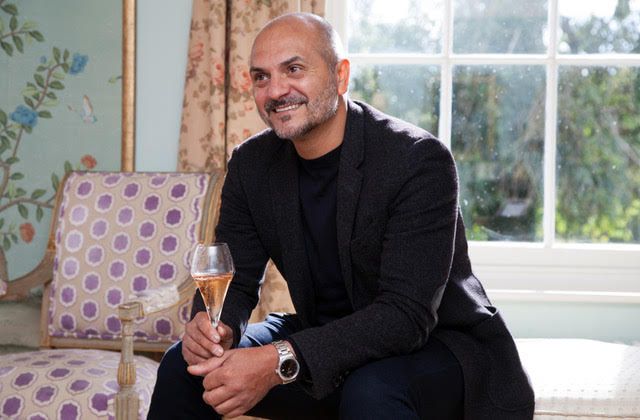James Chase can look at the EU vote from both inside and outside the UK. For not only does his family’s business produce premium spirits from its Herefordshire distillery they also have wine interest in France in the Côtes de Luberon and the Château Chase Constantin wine estate. So the upcoming EU vote is understandably giving him a few sleepless nights.
How have you set about gaining information and insight regarding the referendum on 23rd June?
We employ our government to govern; how can the British population be given enough facts on such a complex issue to make a call on its economic future with a ‘Yes’ or ‘No’ response?
As a farmer, tending and reaping potatoes and apples in Herefordshire, England, and vines in the Luberon, France, how do you feel towards the balance of agrarian subsidies and relief available in the UK versus Europe?
Farming in the UK is not nearly as revered in the UK as it is in France. This is reflected in the less generous support afforded to UK farmers versus the more significant support in France. Maybe if our wine industry in the UK continues to grow at great pace this may change.
Do you have an inkling as regards how your business, in growth, decline, or stagnancy, could be affected, including trading, whether the UK remains, or leaves the European Union?
An exit from the EU is an emotive subject with strong arguments on both sides. If we exit, we would be looking at a greater degree of economic isolation. It is not as if we can do any advance preparation for this – why would the rest of the EU give us the ability to say ‘you’ll be okay, Great Britain outside the EU, don’t worry about it.’
They have zero incentive to do this because undoubtedly the EU is stronger with Great Britain as an integral part. So an exit vote, which we are being told is irreversible, relies on us being able to negotiate a position with our former member states where we need to be left in as strong a position as we are now as a nation.
If we are left in as strong a position as we are now, and the EU is better off with Great Britain part of it, does it therefore mean that the EU has to accept economically losing out? Are we really that arrogant to simply assume our current EU partners will collapse at our feet with the same trading relationships that UK businesses currently enjoy?
Uncertainty creates nervousness in any economy. The global economy is in a strange place, driven by China’s rate of progress, itself unclear. So, do we just toss a coin and see?
That is not to say I am a huge fan of the EU in its current form. Reform is needed. National boundaries are increasingly irrelevant and I believe the EU is far too introverted in its approach in thinking everything stops at internal trading and legislation. Economically, the rest of the world is closer to the EU than it was when the EU was conceived. Technology and economic growth in different regions has seen this change dramatically.
So I think the EU needs to reform and keep up or we will ALL get left behind. The question is whether Great Britain can best look after its interests in or out of the club. The world is a small place these days, principally with the real widespread adoption of the internet which has brought cultures, relationships and trading ever closer. It will inevitably become smaller-seeming, and if we, as Great Britain, puff out our chests and simply say ‘we’ll do it alone, thank you’ we risk damaging, not enhancing, our trading relationships with even our nearest neighbours. Nobody really talks to the quiet kid in the corner.
It is not as if we are a full participating partner of Europe anyway. We don’t have the Euro. As a nation we like to dip our toe in the water but don’t want to risk getting our shorts wet. We have consistently been this way and I doubt it will change. So when David Cameron returned from his negotiations professing that he did a great deal for Great Britain, I looked on with pessimism. Neither Great Britain nor the EU hierarchy could afford to be on the losing side of any negotiations so there were never going to be wholesale changes.
How do you think it would hit business?
From a business perspective, being part of the EU makes it easier to move products and people within a huge and important trading territory for Great Britain. Can the Government guarantee it is going to cost us the same to send overseas the Great British export compared to what it costs now? The answer is no, because nobody at this time knows the real implications of leaving the EU. How can this make Great British businesses comfortable with their exporting future?
How do I plan for this if we exit the EU when any negotiations will take two or three years? It will make entrepreneurs that little bit more cautious when it comes to investment. So do we accept we will have a period of slowdown, or do we, as entrepreneurs, push on regardless, take a gamble and just assume it will be okay?
I can only come back to my point about the British public having elected a Government to govern, and they should take the decisions based on all information available and in the best interests of Great Britain rather than revert to political positioning, point scoring or the inevitable media circus.
What would be the ideal outcome for your family business, post 23rd June?
A bit of common sense and stability without us having the second guess what the economy will hold over the next few years.
Why do you think a referendum is happening at this time?
The government is trying to say that they listen to the public and long ago they promised a referendum, so we’re having one regardless of outcome or the effect on Great Britain’s economy will be.
Can one, in your opinion, vote to leave the European Union while remaining European?
Have our cake and eat it basically? Economically, Switzerland and Norway have achieved it in some ways, so it is possible. Culturally, Europe is much closer now given our free movement ability and assistance of technology, and that won’t change. Finding British produce abroad, s commonplace because we have had the ability to trade more freely.









































